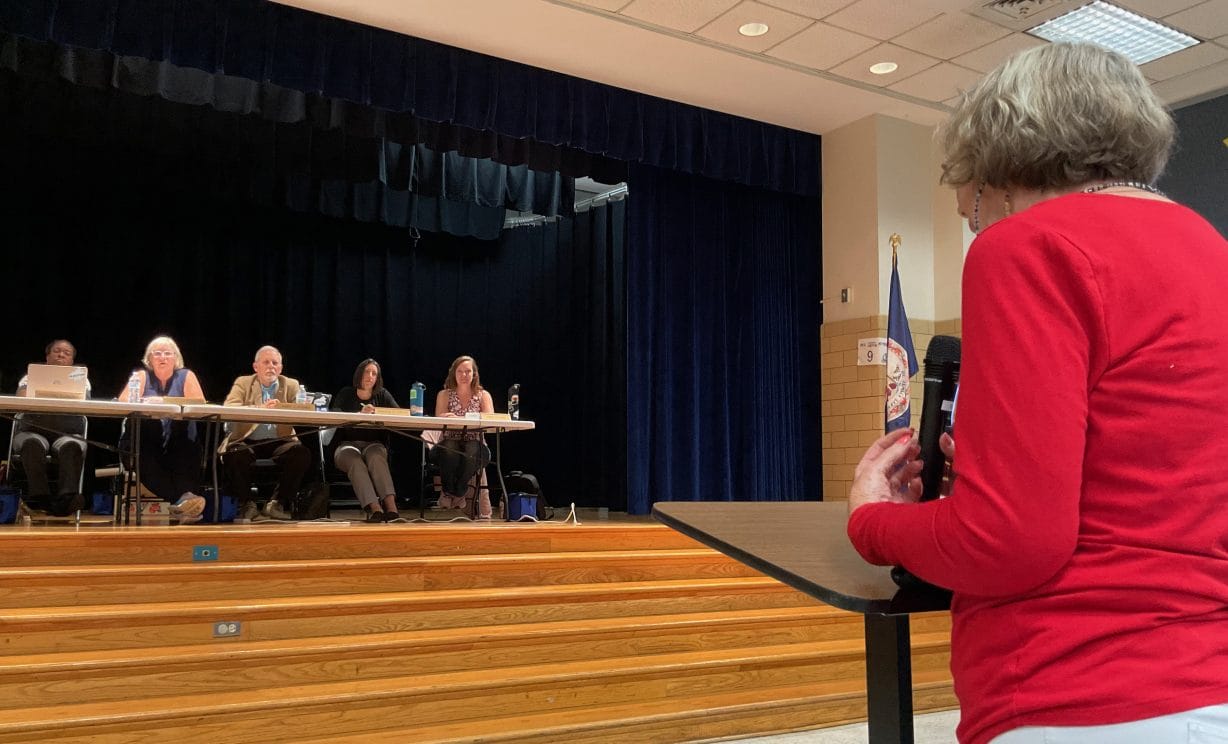
By Haley Thomas, contributor
A sea of red T-shirts met the Harrisonburg City School Board at its Tuesday work session as the Harrisonburg Education Association rallied for collective bargaining for the school district’s employees.
The school board had unanimously voted Aug. 2 to move forward with Superintendent Michael Richards’ recommendation to enable workers to hold an election about collective bargaining. An election would allow non-managerial employees in two groups — certified and classified employees — to separately vote whether to be represented by a specific collective bargaining agent or not. Certified employees include teachers, counselors and social workers, while classified employees include teacher assistants, custodians and bookkeepers.
At Tuesday’s public hearing regarding the potential election, 10 school employees voiced their support for the opportunity for collective bargaining.
Sarah Rimer, a teacher at Smithland Elementary School, was selected chair of the Harrisonburg Education Association’s card campaign. She said the campaign’s purpose was to gauge school employees’ support for unionizing, and it found that 86% of certified employees and 56% of classified employees were in favor of collective bargaining.
Rimer opened the hearing by saying that she wanted to “dispel any myths that the public may have” about unionizing in Virginia.
Rimer said Virginia is one of only six states — along with Arizona, Texas, Georgia, North Carolina and South Carolina — that do not allow collective bargaining for public employees.
“It’s important to understand that in Virginia, collective bargaining will not look like union activity in…other union states,” Rimer said. “Virginia remains a right-to-work state, therefore no employee can be forced to pay dues or join a labor organization.”
Rimer added that teachers and staff won’t be allowed to strike, and that doing so could result in termination.
“So what does it give us? It gives us a seat at the table to discuss the needs of our students and employees,” Rimer said.
Glenda Leonard, a teacher at Waterman Elementary School, said her current working conditions don’t allow time for rest and that she worked an average of 55-60 hours each week last school year.
“Collective bargaining would help staff, such as myself, have a voice to improve conditions that would work toward allowing more time for lesson planning, regular bathroom breaks, smaller classroom sizes and more control over work hours,” Leonard said.
Leonard said improving working conditions and teacher morale would “create a healthier environment for students, which equals improved student performance and less burnout of staff.” She said unionizing could also help attract and retain teachers at a higher rate.
When Barbie Spitz, a new teacher at Waterman Elementary, said she was nervous to address the school board, another member of the Harrisonburg Education Association called out, “We’re with you.”
Spitz said Leonard was right, and the possibility of collective bargaining in HCPS was the “deciding factor” that led her to leave her job in Augusta Public County Schools.
Waterman Elementary School teacher Allie Haverty called the possibility of collective bargaining rights for public employees “a truly historic moment in the Shenandoah Valley.”
“In our classroom and school, I look for opportunities…to build power with relationships, with students and colleagues,” Haverty told the board. “I’m asking you to begin to share your power by trusting us to make our choice to collectively bargain with you. Notice I said collectively bargain with you, not over you.’”
Each speaker during the public hearing said they supported collective bargaining, and each garnered applause and cheers from fellow Harrisonburg Education Association members.
Board member Tom Domonoske said he “was struck that no one came out in opposition” to collective bargaining.
Richards said the board will vote Sept. 5 on whether the district’s certified and classified employees can move forward with an election to decide whether to engage in collective bargaining. If the board votes yes, it will authorize the district’s administration to establish and oversee an election process for these two groups of employees.
“I want to thank [the] staff tonight, all the red shirts, and I love what [Haverty] said about power,” Richards said. “[Collective bargaining] is a better way to exercise power … it’s a better way to work and we get better results that way.”
Thanks for reading The Citizen, which won the Virginia Press Association’s 2022 News Sweepstakes award as the top online news site in Virginia. We’re independent. We’re local. We pay our contributors, and the money you give goes directly to the reporting. No overhead. No printing costs. Just facts, stories and context. Thanks for your support.












